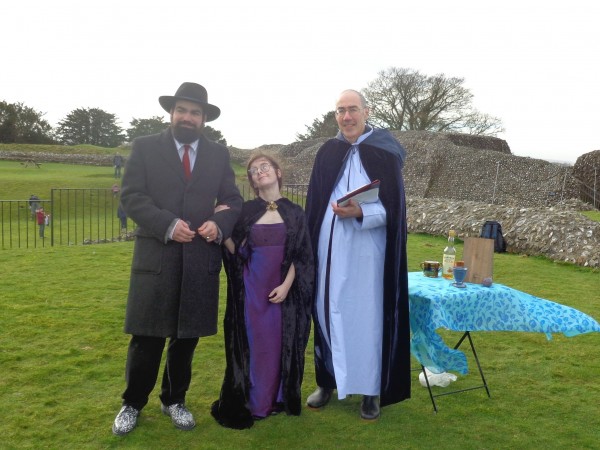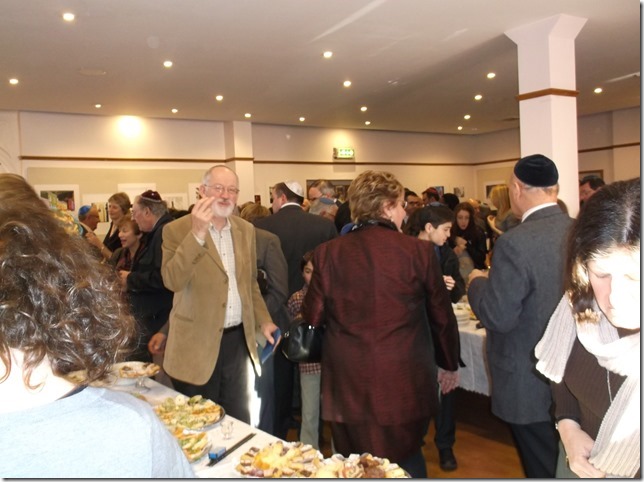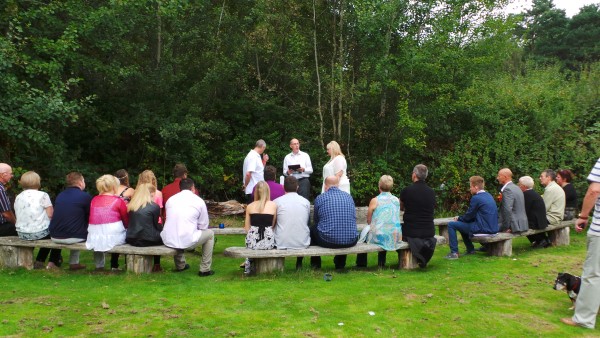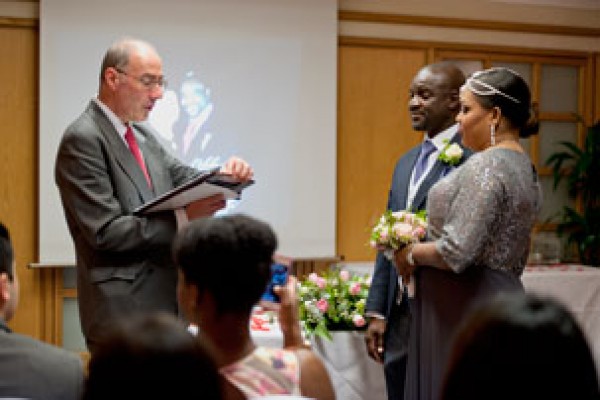
by Michael | May 31, 2016 | Blog
So it’s the unofficial start of summer tomorrow?
As I write, the wind is blowing wildly, the rain lashing down and the temperature is nothing to write home about. Plus ca change?
If you are planning an outdoor ceremony, it pays to be a gambler, especially in this country.
What do you do if you end up with weather like today’s? Obviously, you’ll need to have considered a Plan B.
Plan B
There may not be many options, if you’re celebrating a ceremony at the seaside, up a mountain or at Stonehenge (which is notoriously exposed), but there are a few things that can be done.
I’m doing a handfasting at Stonehenge this midsummer’s day. I am expecting extremes of climate, so I’ll be bringing a couple of golfing umbrellas and either or both of sunscreen or a hat. (I’ll leave my decision about pullovers and the like till the day!)

If you’re holding an outdoor ceremony at a “safer” location, such outside a barn, you may be able to arrange beforehand that there are umbrellas (or parasols) available. You also ought to consider arranging for jugs of water and paper cups to be at hand, in case the weather lives up to the billing of “summery”.
You may also have to think about supplying fold-up chairs, especially if you are expecting a number of older or disabled guests.
Access
Another potential problem is access. How to guests find the venue, especially if it’s in deepest Nature? (Is parking going to be adequate? Do joining instructions include satnav instructions? What about toilets?) You’ll need to be really precise about meeting times and places. It might also be worth advising guests about wearing sensible clothes/shoes, not least if access may be, for example, through a boggy field or up a stony path.
If you’re having a reception afterwards, you’ll need to ensure that directions are clear. (You may also need to warn the venue that timings can’t be guaranteed.)
Audibility
Another factor that you will have to think about – or your civil celebrant may be able to help you with – is the acoustics. If you’re outdoors, you may have to contend with aircraft, neighbours mowing their lawn, the crashing of breakers on the sea, or the like.
As people are going to want to hear every word being pronounced, you are going to think seriously about lay-out. Presumably, you won’t have a sound system up Ben Nevis, or wherever, so the celebrant will need to be able to project his voice loudly and clearly. Guests will also want to be able to hear any words/vows that you may be uttering.
Weighing it all up
It’s simpler and safer to hold an indoor ceremony. An outdoor one risks being memorable for the wrong reasons (“Do you remember X’s wedding, when we all got deluged/when the candles blew away/when we all got sunstroke?”).
However, if you’re prepared to take a risk or two (and consider what to do, if things don’t quite go to plan), an outdoor ceremony can be utterly special and fabulous.
What will you opt for?

by Michael | May 18, 2016 | Blog
I don’t suppose it takes much crystal-ball-gazing to guess that your next celebration is your birthday!
Happy Birthday!
If it is, how do you plan to mark the occasion? Off down the pub? Throw a party? A special outing? A restaurant meal out together with family or friends, or both?
![DSCF0126[2]](https://vowsthatwow.co.uk/wp-content/uploads/2015/02/DSCF01262.jpg)
What if it’s a “big” birthday, though? Ever thought of adding an extra dimension to the affair? (And if it’s not your birthday and you’re having a peek out of curiosity, you may consider adapting the following and organising this as a surprise!).
If you’ve decided on an event with guests, then why not book a civil celebrant? With your input, he can come up with the right words, maybe a blessing (which may or may not be religious) and perhaps a short summary of your life and achievements. It need last 5-10 minutes only, and could end, say, with a toast being proposed. It would be something very special and memorable.
Note that if you are organising this at a restaurant or hotel, you need to check practicalities (especially if you’re sharing the room with the public!).
Happy Anniversary!
Anniversary celebrations are catching on these days. There are lots of reasons to have these. Just a few examples would be:
- to mark an anniversary ending in -5 or -0
- to renew vows (because circumstances may have changed)
- to announce to the world that you’ve successfully come through a difficult period
Whatever the reason, your celebrant can help you mark the occasion in a way that reflects your personalities. The ceremony may last 10-25 minutes (or whatever you choose), and can include religious components, if you want these, also music, readings (secular or otherwise), reciting of vows (new or old) and rituals (such as both of you lighting a Unity Candle – even in conjunction with your children).
So whether someone is planning a surprise or whether you’re choosing this for yourself, your civil celebrant can work with you to create a tailor-made ceremony of your dreams, and will conduct it for you memorably and professionally.
So how about a ceremony that is personal and maybe a little bit unconventional?

by Michael | May 3, 2016 | Blog
It can be a major mistake to overlook the opportunity to celebrate a Vow Renewal.
Some people assume that it’s simply an excuse to blow a load of money. Others don’t see the point: so what, if it’s my tenth (or whatever) year of marriage?
But you could really be missing out on something special.
Something special
What if you could come away from your Vow Renewal feeling the same as this couple?
“Thank you being our celebrant and putting together our vow renewal, the words felt very personal to us which made it quite an emotionally fuelled ceremony that just flowed but embraced everything we wanted with the readings, blessings of our rings, lighting of our unity candles and finally the signing of our certificate. Our friends and family all commented on how we always do things a bit different and this ceremony and celebration exceeded that. Thank you x”
[C & D – Genuine testimonial]
So what is a Vow renewal?
Essentially, it is an opportunity to reaffirm publicly your marital relationship. You may want to mark a special milestone year – or a new time in your marriage (following ill health, financial difficulties or even a rocky relationship).
Unlike your wedding, there are no legalities to worry about. The ceremony can be as lavish or modest as you choose. It can take place in a back garden, beside a canal, in a hotel or at the top of the Shard. You choose.

How is the occasion marked?
There is no prescribed ceremony, so if you want a religious or part-religious service, that’s fine. Secular is also fine! You want to dress up formally? Fine too! Or come casually? Why not?
How about including friends and/or relatives in the ceremony? Maybe you’ve got children and you want to involve them? You could include the lovely Unity Candle ritual. You might consider a handfasting.
You may want to have your rings blessed or recite your vows (your marriage ones, or a new set, if things have changed). You may want to play your favourite band’s music. The choice is huge.
How you mark the occasion is absolutely up to you (though your celebrant will gladly guide and inspire you!).
How to arrange it?
This is likely to be a much more informal affair than a wedding. You may or may not offer a reception. It might be a buffet. You can hold it at a place that means something special to the two of you.
You will probably only need to do the following tasks as a minimum:
- Book a venue (unless you’re using your back garden, say)
- Organise the reception (according to the scale you are envisaging)
- Book your civil celebrant
- Send out invitations
So you can have the people you love and choose around you, as you celebrate your special occasion in the way that you want and dream of.
Isn’t that worth considering?
Michael would be delighted to give you more information or help you arrange your ceremony. Just contact him for a non-obligation chat.
by Michael | Apr 26, 2016 | Blog
We all know that your wedding day is supposed to be a happy day – indeed, the happiest of days. But what if things go wrong? What if you make a fool of yourself? What if something gets forgotten? Few people avoid wedding day stress.
One key step
You can make it far more bearable with good preparation. If you have organised things well in advance (or maybe you have employed a wedding planner to do this), then you should be able to enjoy the day without worrying about last-minute details.
Just to depress you, I’d like to point out that, of course, almost anything CAN go wrong. Your car may not collect you on time, it may break down, tremendous traffic – or weather – may hold you up. The venue may have a power cut.
And that’s merely the beginning of the list!
Attitude
You can fear the worst – or anticipate the best. Rather than become totally paranoid, accept that there are certain things you cannot legislate for – but that are highly unlikely to happen. You can spoil the whole day by worrying about something that just isn’t going to happen.
Preparation
That’s not to say that you should be casual or negligent. You are most likely to be safest, if you employ good professionals – whether caterers, celebrants, florists, photographers, event planners or others.
If you have to deliver a speech, there are things you can do to prevent this from becoming a ghastly experience. I really can’t do better than refer you to a couple of blogs I have written on this subject.
Checking
It’s worth checking with your suppliers a day or two in advance that everything you have stipulated is in hand and that they know when and where they are expected.
The venue should have a planner who will cover this, but if you have the chance to arrive early, make a visual check of the room(s) . Can you spot anything potentially dangerous, like trailing wires? Is anything missing? Is there enough of whatever you will need?
On the day
It is natural and almost goes without saying that you will be nervous. Whether bride, groom, parent, best man etc., you will have at least a moment in the spotlight as centre of attention. Chances are, you are unused to the limelight.
A bit of adrenalin won’t harm you. And you do know that everybody will be on your side, willing you on.
A good strategy
Best to practise this well in advance, and on the day this will be a great calming exercise: take a few moments out to sit and concentrate on your breathing. Aim to slow it down, but don’t breathe too deeply – after all, it’s not a great idea to pass out!
A less good strategy
Alcohol is the answer to all problems. Well, no, it isn’t, although, for some, a small amount may settle a few nerves. Getting drunk (“to forget”) is a big mistake and may increase stress (often for other people!).
Phobia
If, despite my suggestions, you fear that it will all prove too much for you, then I recommend EFT (or “tapping”), which can be remarkably effective in dealing with extreme cases. Isobel has many years of experience in helping to create confidence in any situation. Reach her at www.intherighthands.co.uk.
If you simply want a bit of reassurance and guidance, then please contact me. I take pride in putting people at their ease on their big day.
by Michael | Apr 26, 2016 | Blog
If you are not pagan, you may be blissfully unaware that Beltane will soon be upon us. It is usually celebrated on 30th April/1st May and is one of four seasonal Gaelic festivals that occur each year.
For the Celtic people, Beltane marked the beginning of summer. Cattle would be driven out into the summer pastures, and rituals performed to protect the cattle, as well as the crops and people, and to ensure growth.
Rituals
Beltane is known for its bonfires. Flames, smoke and ashes from these bonfires were considered to have protective powers. The herdsmen and their cattle would walk around the bonfire (or between them, if there were two). They might even leap over the flames or embers.
When the fire had died down, people would daub themselves with its ashes and sprinkle them over their crops and livestock.
Household fires would be extinguished and re-lit from the Beltane bonfire. There would be feasting and offerings to the gods (or, more precisely, a supernatural race akin to fairies).
Cattle and their cattle-sheds would be decorated with yellow May flowers (this possibly evoked fire).
It was also believed that at around this time pagan gods and nature spirits were at their most active, and many of the Beltane rituals were designed to appease them.
According to some, the fire rituals were meant to mimic the Sun and ensure a supply of sunshine for men, animals and plants. Others believed that they symbolised burning up and destroying all harmful influences.
Revival
About 60 years ago, Beltane celebrations had more or less died out; however, there has been a revival in recent times, notably thanks to Celtic neo-pagans and Wiccans. It is also celebrated in the Southern hemisphere (although around 1st November).
If you are interested in pagan/Celtic elements as part of a ceremony that you are planning – be it wedding, anniversary, special birthday or vow renewal – , then please contact me, your independent civil celebrant, and we can put together a wonderful handfasting ceremony.
Featured image source: telegraph.co.uk





